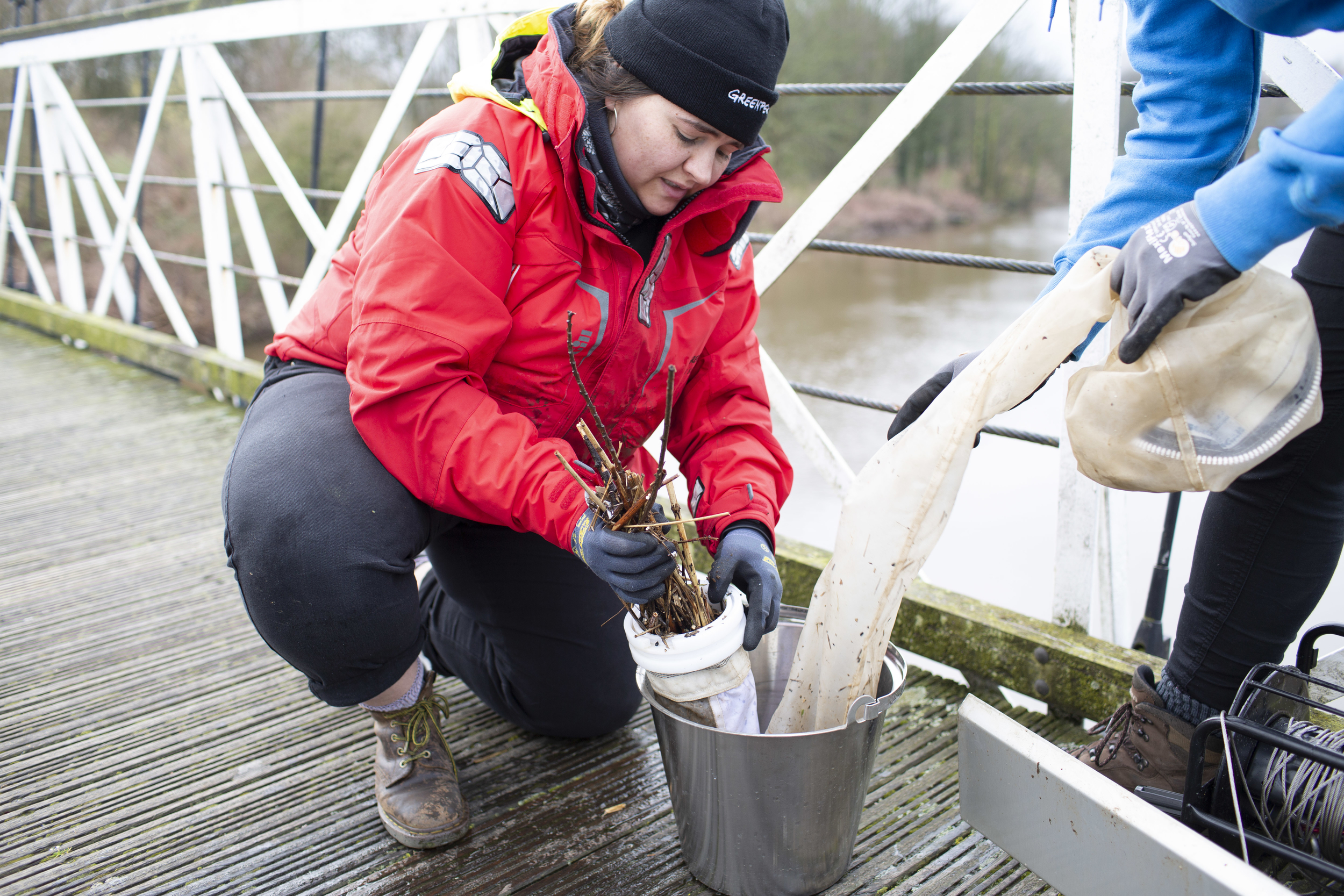We intervene where our action is most likely to spark positive change – whether this is intervening at the point of an environmental crime, targeting those who have the power to make a difference, engaging people and communities who can leverage change, or working for the adoption of environmentally responsible and socially just solutions. Usually, our campaigns involve elements of all of these tactics.
Investigations
Investigations are a fundamental part of Greenpeace’s campaigns. Through investigations we can expose those responsible for environmental destruction and shed light on the areas of operation that they would rather stay in the dark.
Our investigations provide research, evidence and intelligence about environmental crimes and their perpetrators to inform and enable our campaigns. Using a variety of techniques from field work, satellite imagery, business and financial analysis, and working with whistleblowers, our investigations provide the facts and evidence Greenpeace needs in order to bring about change. Our investigations have led to Royal Dutch Shell being driven from the Arctic, UK plastic waste being banned from Malaysia, and a huge area of the Arctic ocean being declared off limits to industrial fishing.
Since 2015 Greenpeace has also been producing investigative journalism stories. As Unearthed we publish accurate, honest, change-making stories that illuminate parts of our changing world no one else is looking at. Unearthed is able to take on big, risky stories that require time and resources many mainstream media outlets don’t have but that need to be told.
Lobbying
Through lobbying, Greenpeace can encourage and persuade those in positions of power to take the bold steps needed to protect the planet. We make sure that our campaign demands are clearly heard by decision-makers like politicians and business leaders, and we ask them to translate these demands into real action that protects the environment.
In the UK, our political unit works with people across the political and policy arena in Westminster and across Britain. We meet with politicians to build political support for our campaigns, produce and disseminate reports and briefings, organise events for MPs in Westminster and at Party Conferences, and make submissions to consultations and committee inquiries.
Through the political lobbying network, a network of trained volunteers who lobby MPs and councillors around the UK, we are able to take national and international issues that Greenpeace works on and make them relevant and impactful at the local level. The network engages MPs, councillors and other decision makers around our campaigns.
Globally, Greenpeace campaigns to influence international treaties and conventions on environmental protection so they are as strong and ambitious as possible. We work hard behind the scenes at COP climate conferences, and engage policy makers and diplomats at international forums like The Convention on the Conservation of Antarctic Marine Living Resources (CCAMLR) to encourage countries across the world to work together and deliver stronger environmental protections for the benefit of all.
Peaceful direct action
Taking peaceful, non-violent direct action has always been at the heart of Greenpeace’s work. Greenpeace was founded in 1971 by a small group of people who set sail in an old fishing boat to try and stop a US nuclear weapons test on an island off the coast of Alaska.
Direct action is about physically acting to stop an immediate wrong at the scene of the crime. Ordinary people around the world can act to confront those in positions of power with their responsibility for stopping global environmental destruction. We act to raise the level and quality of public debate. Above all, we act to provoke action from those with the power and responsibility to make change happen.
Guiding all of our actions, always, is a commitment to nonviolence and personal responsibility. These principles are inspired by the Quaker concept of ‘bearing witness’, which is about taking action based on conscience. Everyone on every Greenpeace action is trained in the principles of nonviolent direct action (NVDA).
Our fleet of ships allows us to take action and bear witness at the scenes of environmental crimes around the world, often in remote and difficult-to-reach places. When taking physical action to stop an environmental wrong isn’t possible, ‘bearing witness’ through one’s physical presence at the scene of the crime is another way to act on conscience and remind those responsible that they have a higher responsibility than the corporate bottom line.
Read more about some of Greenpeace’s recent direct actions.
People power
Across the world, millions of people play a huge and crucial part in Greenpeace’s work. This might be through signing petitions and sharing social media posts, joining to volunteer with local groups or on demos and protests, and even taking part in direct actions. Our campaigns give people a chance to channel their love for the natural world into real action.
Change only comes when a critical mass of people demand it. Greenpeace helps ordinary people achieve momentous change. Our campaigns give them simple and effective ways to make demands of elected politicians or corporations committing environmental harm. From the tens of thousands of messages Greenpeace helps people send, to the sometimes millions of signatures collected on petitions, Greenpeace enables people all over the world to come together and demand the change they want to see.
Science
All of Greenpeace’s work is guided by and informed by science and research. We use facts and peer-reviewed research conducted by scientists all over the world to inform our campaigns and policies.
The Greenpeace Research Laboratories form part of the Science Unit of Greenpeace International. Based at the University of Exeter in the UK, the laboratories provide scientific advice and analytical support to Greenpeace campaigns worldwide, over a range of disciplines. The laboratories are equipped with hardware for the analysis of heavy metal and organic contaminants in a range of environmental samples. An extensive database of scientific literature has been built up since 1986 and serves as a core information resource.

Greenpeace campaigners and scientists sample for microplastics on the river Mersey, UK. © Steve Morgan / Greenpeace
